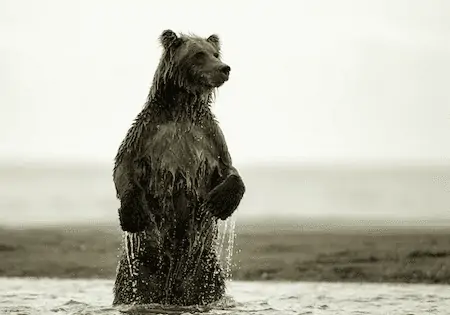Hiking is a great way to explore the undiscovered beauty of wild nature and also a great form of exercise and fun.
But it can get dangerous all of a sudden if you don’t take the necessary measures considering the probable threats of your hiking area. Bears are one of the scariest wild animals that can cause life-threatening situations.
They are also known for being unpredictable and aggressive when they feel threatened or hungry. It can cause you serious injury or even death if you are not cautious.
So, if you are going to hike in a bear country or bear-prone region, knowing how to avoid bears while hiking on the trails can be the difference between a fun day outside and a deadly encounter.
12 Ways to Avoid Bears While Hiking on the Trails
There are several effective ways to avoid or repel bears while you are hiking on the trails. We have listed them down below for your convenience.
#1. Carry Pepper Spray
Carrying pepper spray with you while hiking is an excellent idea to avoid bears while hiking. This will give you a chance to scare them off when it looks like they might attack.
It’s also useful for keeping other animals at bay, especially while camping overnight in the woods.
#2. Make Noises
Bears are most active during dawn and dusk, but they may come out any time of day if they are hungry or looking for food.
If you are in an area where this is more likely to happen, make some noises by talking loudly or singing songs rather than letting them sneak up on you. You can also clap your hands, bear horn, or even use bear bells that jingle as you hike.
#3. Avoid Berry Patches & Fish Streams
Bears love eating berries and eating different types of fish. So, it’s a common scenario to find them around berry patches and streams with fish when they are hungry.
Plan your route ahead of time so that you can avoid going near these places if at all possible. It’s better to use other routes or wait till later than risk an encounter with a bear waiting for its next meal.
#4. Don’t Leave Food on the Ground
It’s a good idea to remove any stashes of food from your tent or picnic area as soon as it’s time to go home, even if they are miles away from where you saw bears before.
It may look like there are no traces of humans around but that doesn’t mean one won’t be along later looking for some food to steal.
Always clean up after having food, so that you don’t leave anything tempting lying around for a bear to find and eat!
#5. Watch Bear Signs
This includes digging or scat piles, torn-up logs, and anything with a strong smell of fish or other food in it.
This is a clear indication a bear has been around recently so it’s best to avoid this area until the animal moves on to another place that can provide it with better food sources.
#6. Avoid Camping Near Bear Nests
This is especially true during times of the season like spring, summer, and fall when a mother would be protecting her cubs.
It’s even worse if you get between a momma bear and her little ones. Always try to keep your distance far from these areas, so they don’t see you as a threat to their babies or hideouts!
#7. Don’t Swim Where Bears Fish for Food
Bears are excellent swimmers and will brave rapids or moving water to get what they want. Someone swimming might be mistaken for a fish by a hungry bear looking for some food!
If you go underwater, they may not see you under the surface of the water so it’s best to stay in shallower areas where there is less risk.
#8. Store Food Safely
If you do encounter any bears while hiking trails, your food is the main attractant to invite them to visit you, so keep everything stored in areas that are easy for humans but harder for animals.
You can store them in car trunks or bear containers hanging on trees with ropes far above ground so bears can’t reach them even if the container seems like it’s on the ground.
#9. Keep Pets Away
Pets will be seen by a bear as any other type of prey and will lose the fight if the pet starts barking and running in front of them.
If you are out camping with your dog, avoid areas that might wind up bringing you closer to where bears are living so you don’t have to worry about this problem!
#10. Lock Vehicle Tightly
Bears are usually known to be able to pick out a door lock if their sense of smell gives them the vibe that there might be food nearby.
So, it’s best to keep these areas empty or sealed off from any smells at all so bears won’t even bother trying to open up the car for food!
#11. Avoid Hugging Trees
This may seem strange but it’s true – bears use scent from the tree bark to communicate with each other during mating season, so they will be around this area more often if they can smell a female bear nearby waiting to mate.
If you hug a tree, a bear might mistake you for a female bear and come to investigate.
#12. Avoid Wearing Headphones
You need to make as much noise as possible while going through bear territory just in case one of them decides to investigate what you are.
Wearing headphones can drown out any noise you might be making. So, having earbuds on your ears can be dangerous while hiking trails even if it seems like bears aren’t anywhere close by!
What to Do If a Bear Approaches You on a Hike?
- The first rule is to remain calm, don’t panic! Don’t lose your mental strength.
- Second, do not approach the bear. Normally, when a mother is with cubs, she will send them up a tree while she confronts any would-be intruders. Remain where you are so that if she does come after you it’s only to drive you away from her babies.
- Back off slowly and talk to her in a soft, but firm tone. If she starts getting closer or begins swatting at the ground with her paws, speak louder and retreat backward.
- Do not run! This is when most people get hurt. Bears will often give chase if they believe you are running away from them.
- If you have bear spray, now is the time to use it. If not, then put your backpack on and use it as a shield to keep the bear from biting or clawing at your midsection.
Final Words
In conclusion, hiking in bear country is adventurous and potentially dangerous at the same time. But that doesn’t stop people from exploring the wilderness of nature.
Just take the necessary precautions, be aware of your surroundings, and remember the above cautions to avoid bears while hiking on the trails and you’ll have a great hike.
We hope this article helped you understand how to avoid bears while hiking on the trails in a comprehensive manner.



